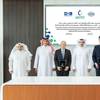Offshore Wind Farm O&M Pinpointed at U.K. Conference
Almost 200 senior figures from across the U.K.’s offshore wind industry recently debated the future of managing operational wind farm projects.
Delegates assembled to hear what lessons can be learnt from pioneering wind farm operators off the East of England coast, and the sharing of experiences and thoughts from past and potential developers which will help shape the future of the industry.
The 'Asset Management: Reducing Cost, Addressing Risk' conference was staged at the OrbisEnergy centre in Lowestoft, hosted by national trade body RenewableUK.
The event challenged the supply chain to rethink how operations and maintenance (O&M) can become a more integral part of planning at the design and construction phase of future windfarms. Factoring it in earlier could help substantially in reducing overall costs.
A selection from some of the contributions to the conference are as follows:
Jon Beresford, operations manager for E.ON's Scroby Sands windfarm off Great Yarmouth, outlined some of challenges of setting up the UK's first commercial windfarm.
Beresford explained how their initial approach to O&M had been hands off, leaving it principally to the turbine manufacturers. But it became clear, after the five-year warranty, that they should take responsibility for everything from cleaning to fitting new blades or gearboxes with part supply agreements now in place which substantially reduces repair costs.
Invaluable lessons also came from the more recent Greater Gabbard windfarm off Suffolk.
Stephen Rose, SSE's offshore windfarm generation manager, said they quickly found that they needed a good mix of transit vessels and the support of a helicopter to maintain maximum access to turbines in variable weather. Even then access was restricted to 60-66% of the time.
Ramon Parra, offshore O&M manager for Vattenfall, agreed that waiting time and transport time were two of the major cost drivers in O&M with 45% or more of the issues attributable to bad weather.
Parra went on to outline the logistics options for the East Anglia project potentially using a mix of Offshore Access Vessels, Crew Transfer Vessels, Offshore Access Platforms and helicopters.
For turbine manufacturer Areva Wind, UK country director Julian Brown accepted that its emphasis must be on maximum reliability and availability, better remote control, easier maintenance and having skilled people nearby and the right spare parts available when things did go wrong. In test trials offshore in 2011 its six turbines had proved 98% operational.
Stuart Thornton, of Fred Olsen United, outlined the company's new concept to tackle transport problems in offshore windfarm O&M - 'a mother ship' prototype which would accommodate 40 people, transport parts and equipment, be a base for smaller crew transfer vessels and have stability created from being a one-time floating casino where the roulette wheel had to be consistently level!













